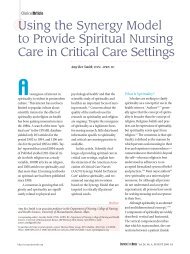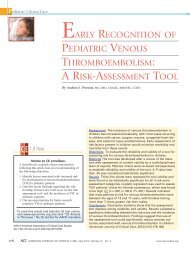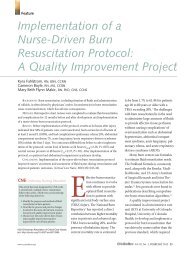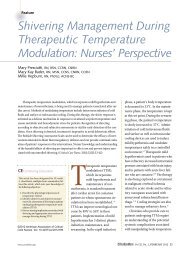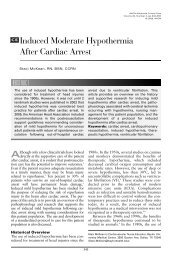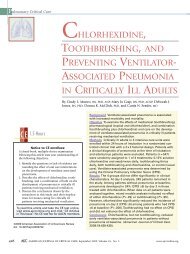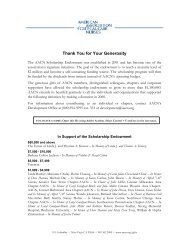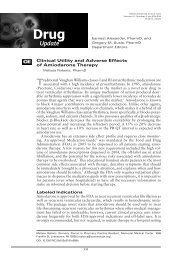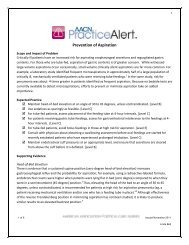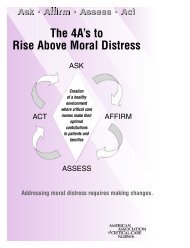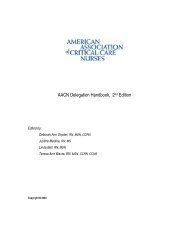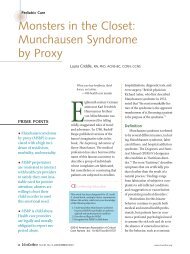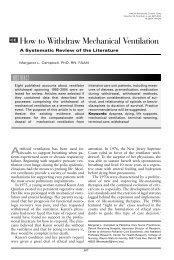CCRN/PCCN Exam Handbook - American Association of Critical ...
CCRN/PCCN Exam Handbook - American Association of Critical ...
CCRN/PCCN Exam Handbook - American Association of Critical ...
Create successful ePaper yourself
Turn your PDF publications into a flip-book with our unique Google optimized e-Paper software.
neonAtAL CCRn testABLe nURsIng ACtIons (CONTINueD)<br />
Endocrine<br />
• recognize normal and abnormal physical assessment findings<br />
• recognize signs and symptoms <strong>of</strong> endocrine emergencies, initiate interventions and seek assistance<br />
as needed<br />
• Identify and monitor normal and abnormal diagnostic test results<br />
• Implement treatment modalities for acute hypo/hyperglycemia (e.g., insulin therapy)<br />
• Monitor patient and follow protocols for surgery related to the endocrine system<br />
• Manage patients receiving medications and monitor response<br />
Hematology/Immunology<br />
• recognize normal and abnormal physical assessment findings <strong>of</strong> patients with hematologic problems<br />
• recognize normal and abnormal physical assessment findings <strong>of</strong> patients with immunologic problems<br />
• Identify and monitor normal and abnormal diagnostic test results (e.g., PT/INr, PTT, fibrinogen, CbC)<br />
• Manage patients receiving medications (e.g., IVIG, steroids, chemotherapy) and monitor response<br />
• recognize and manage complications associated with transfusion <strong>of</strong> blood products<br />
• Monitor patient and follow protocols pre-, intra- and post-procedure (e.g., plasmapheresis, exchange<br />
transfusion, autotransfusion)<br />
• recognize signs and symptoms <strong>of</strong> hematologic/immunologic emergencies, initiate interventions, and<br />
seek assistance as needed<br />
Neurology<br />
• Identify and monitor normal and abnormal physical assessment findings<br />
• recognize and monitor normal and abnormal neurological diagnostic test results (e.g., ICP, head CT scan,<br />
lumbar puncture)<br />
• recognize indications for and monitor/manage patients requiring neurological monitoring devices and<br />
drains<br />
• Manage patients receiving medications (e.g., mannitol, hypertonic saline, sedation, neuromuscular<br />
blockade, anticonvulsants) and monitor response<br />
• recognize signs and symptoms <strong>of</strong> neurological emergencies (e.g., increased intracranial pressure,<br />
herniation, decreased LOC, seizure), initiate interventions and seek appropriate consultation<br />
• Monitor patient and follow protocols pre-, intra- and post-procedure (e.g., ICP insertion, lumbar puncture)<br />
• Monitor patients and follow protocols for neurosurgery<br />
Gastrointestinal<br />
• Identify and monitor normal and abnormal physical assessment findings<br />
• recognize and monitor normal and abnormal gastrointestinal diagnostic test results<br />
• recognize indications for and manage patients requiring gastrointestinal monitoring devices<br />
(e.g., intra-abdominal compartment pressure)<br />
• recognize indications for and manage patients requiring gastrointestinal drains<br />
36<br />
continued



